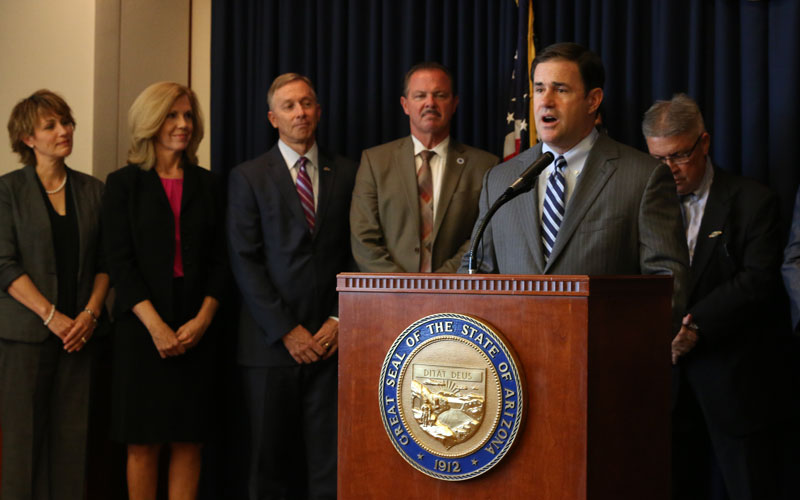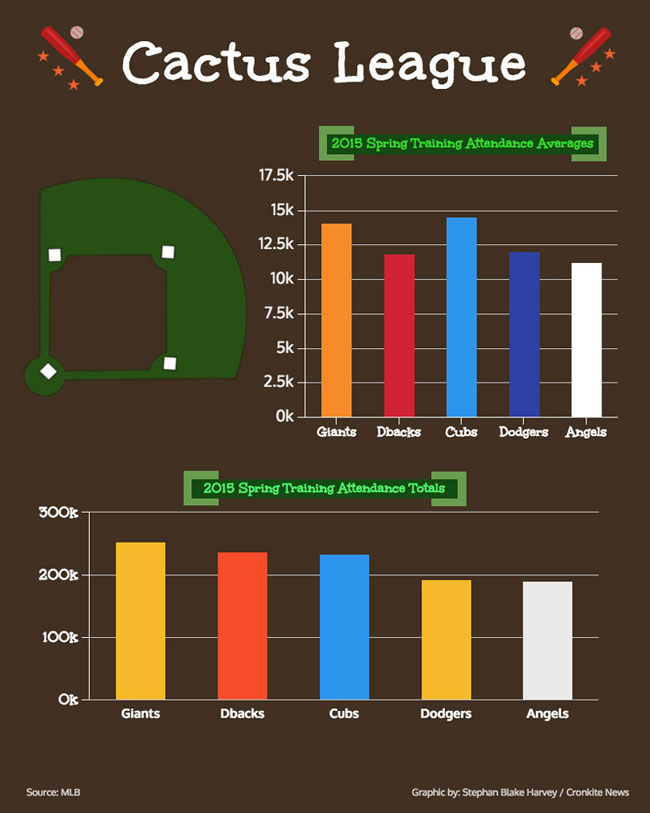
Gov. Doug Ducey was among the speakers at the event. “The Cactus League is growing stronger by the year and is a major contributor to Arizona’s economy,” he said. (Photo by Ginger Poulson/Cronkite News)
Greater Phoenix has increasingly become a destination for MLB teams to prepare for the season. Seven ballclubs called the Valley their spring training home in 2002.
By 2011, that number had more than doubled to 15, with six teams moving from Florida and the Arizona Diamondbacks and Colorado Rockies transitioning from Tucson to Scottsdale.
However, since 15 is an odd number, it leads to a lot of split-squad games, meaning that teams play two opponents in the same day, with half of the team playing in one game and half playing in the other.
Cactus League President Mark Coronado said that could change, with additional teams expressing interest in making the move from Florida to Arizona. Coronado made the comments Thursday following a news conference to unveil a Cactus League economic impact report.
“We’ve had conversation with several – nothing official,” Coronado said. “I will tell you that from a scheduling perspective, 16 teams is really ideal.”
Coronado said more than 16 is conceivable but not likely given the Cactus League’s focus on keeping the teams relatively close to each other.
As the Cactus League has expanded, the facilities have remained in close proximity, with no two spring training complexes more than 45 miles apart.
Compare that to the 15 teams in the Grapefruit League spread across Florida, making for increased logistical challenges, including longer travel times for teams and fans.
That proximity is a huge draw for teams training in Arizona, but it also puts constraints on how the league could expand.
“You’d have to find a municipality (for an additional facility), and there aren’t many. We have 10 jurisdictions, so there aren’t many left that can afford it,” Coronado said. “What people don’t really get is, it’s not just building the facility, it’s maintaining it on an annual basis.”
Finding a place to expand within the county isn’t the only challenge.
“The problem is we’re having a hard time taking care of Goodyear and Glendale and funding the renovations, so we really shouldn’t be looking at expansion until funding is identified and stabilized,” Coronado said.
The Arizona Sports and Tourism Authority handles funding for construction and renovations to Cactus League stadiums. But according to an Attorney General’s Office audit released earlier this month, the authority hasn’t been a stable source of funding for the Cactus League.
Insufficient funds have delayed payments to high priority projects in Tempe and Scottsdale, which has pushed back commitments to lower priority projects in Glendale and Goodyear.
The Arizona Legislature established the authority in 2000. Maricopa County voters approved Proposition 302, which created a hotel bed tax and a rental car surcharge to fund the authority’s responsibilities.
The authority made agreements with eight cities to contribute funds to their stadium projects.
However, a Maricopa County Superior Court judge ruled last year that the use of the funding for sports facilities is unconstitutional, citing Article 9, Section 14 of the state’s Constitution, which says no money “derived from fees, excises or license taxes relating to registration, operation or use of vehicles on the public highways or streets” can be used for purposes unrelated to highways.
The judge ordered the state of Arizona to refund the taxes, leaving cities that anticipated contributions from the authority looking for a different source of funding. The matter is still tied up in the courts.
“The future of the league really needs to have a stable funding mechanism that can continue to renovate these facilities and possibly explore expansion,” Coronado said.
While expansion may be on the back burner, Arizona is reaping dividends from the Cactus League’s past expansion.
On Thursday, Gov. Doug Ducey, Coronado and other Valley officials reflected on the economic impact the Cactus League has on the state.
“Incrementally, the expansion has really taken care of us,” Coronado said.
Ducey highlighted the league’s $809 million economic impact on Arizona. The number comes from a study conducted by FMR Associates for the Cactus League Baseball Association.
“The Cactus League is growing stronger by the year and is a major contributor to Arizona’s economy,” Ducey said.
